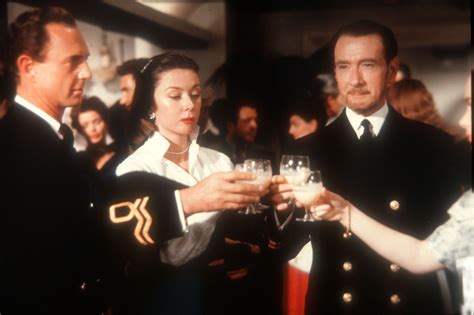A movie I’ve enjoyed for many years is the 1956 World-War-II drama “The Man Who Never Was.” I saw it forty years after its release when I spotted it among the numerous VHS tapes at the local library and checked it out on a whim. Starring Clifton Webb, the plot revolves around a plan to deceive the Germans into massing troops in Greece, the site of a supposed invasion, where in fact no attack will take place at all.
In actuality, the Allied forces are preparing to land in Italy. The ruse, based on a true story, is realized through the rather odd strategy of allowing the body of a supposedly drowned Royal Marine on whose body the plans are concealed to wash ashore in Spain, with the British pinning their hopes on the chance that the Spaniards will pass the information to the Nazis.
The glitch in the plan is somewhat apparent, as Lieutenant Commander Ewen Montagu and Lieutenant George Acres both admit: How can you get someone to volunteer to drown in an airplane crash at sea and then drift ashore in Spain? The answer to the questions is easy enough. You can’t, and Montagu and Acres don’t try. Nevertheless, what they decide on contains its peculiar problems. Can they find a corpse of the proper age who did drown or at least appears to have drowned whom they can dress as a Royal Marine, and place it, with the help of a submarine, in the currents off Spain in hopes that the corpse will reach shore?
Men of the right age who died of drowning prove challenging to find in wartime Britain, but a solution presents itself in a young man who died of pneumonia. The state of such a man’s lungs proves almost indistinguishable from those of one drowned. But will the family release the body?
In one of the supremely poignant scenes from the film, Montagu speaks to the profoundly bereft father about the part his dead son will play in serving his country, a guaranteed call to duty except that the father is a Scot whose never had any great love for the Acts of Union. He nevertheless agrees to the request, and “Major William Martin” is born as a full-grown man who, despite the fiction of his new identity, never actually experienced a single day of life. He has rank, wears shirts that he “bought” at Gieves (with detachable collars, no less), and almost assuredly has a fictional family that will shed faux-tears for their departed loved one.
That’s not the entire plot, but I hope it’s enough to inspire others to give “The Man Who Never Was” a try. All in all, it’s a fascinating story with an ending that is deeply moving, especially with its concluding voice-over quotation of lines from the sixteenth-century ballad “The Battle of Otterburn”: “Last night I dreamed a deadly dream, / beyond the Isle of Skye. / I saw a dead man win a fight, / and I think that man was I.”
There can be no doubt that, like “William Martin,” the poor dead man who was never a marine, and, so far as we know, never intentionally heroic, most of us probably affect the world around us in ways we will never know, regardless of our ambitions. The poignancy of a young man who died insignificantly of pneumonia “saving” hundreds or perhaps thousands of British lives after his death, by means not of his own making, is the stuff of grand story-telling, but it’s also, I suspect, must closer to everyday reality than we think.
On rare occasions, some of us get hints of this. In my own experience, I often come to the end of a semester dissatisfied with a class, only to find generously penned notes on my office desk from students that I assumed cared not one whit about the subject, calling me their mentor and thanking me far in excess of anything I believed I’d really done.
What are those notes but a blessing? And I hope I don’t overstate the case if, in light of their existence, I say that for every student who writes a note there are many more who don’t but are equally grateful. Without question, notes and students alike remind me that I do much more than my assessment and occasional outright pessimism indicate; more than that, they should tell me that God has a purpose for me that nothing in this life will frustrate as long as I work with confidence in Him.
Christians who labor in things big and small, this is an undeniable truth and comfort. We perform our various tasks mostly ignorant of the good we do others, even as a divine plan we know little of and of which we are a part moves steadily toward its glorious completion. It’s perhaps only a small exaggeration to say we are like “Major William Martin,” men who never were, playing parts we cannot comprehend, who will one day find ourselves wearing medals we didn’t know we’d earned. And, so it seems to me, that’s exactly as it should be.














